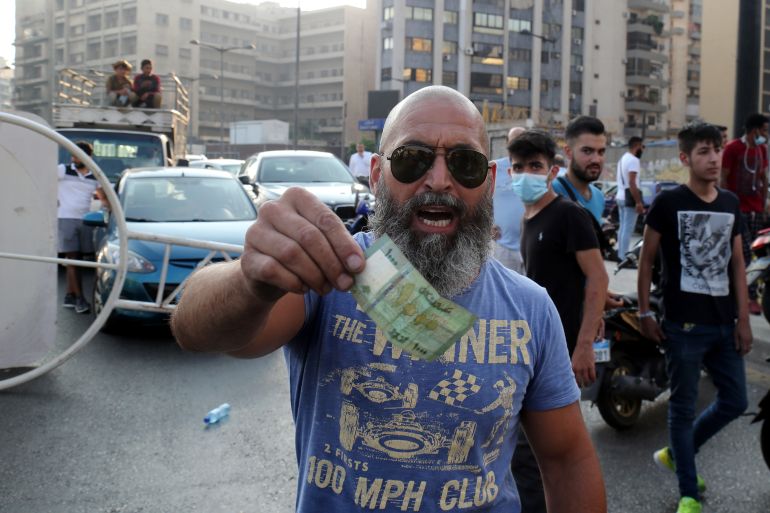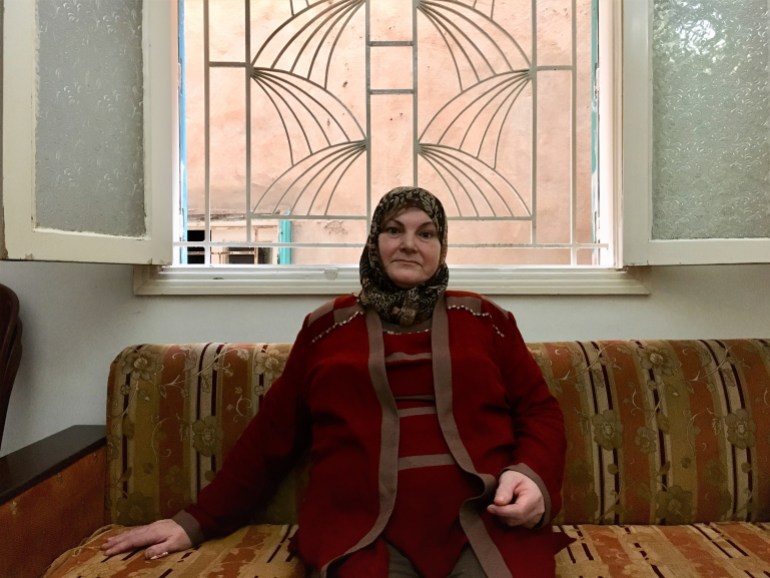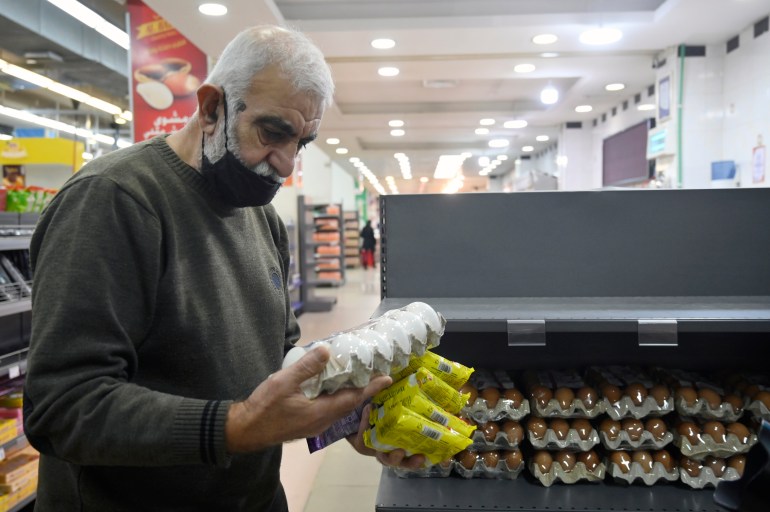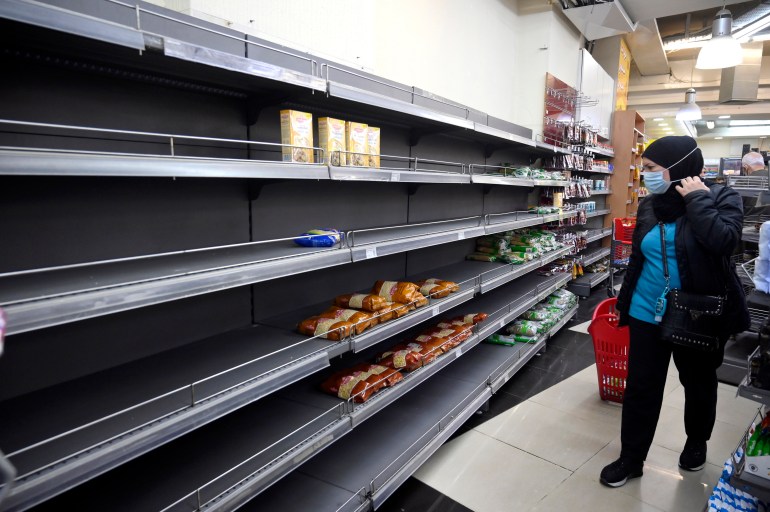In crisis-hit Lebanon, celebrating Eid is for the ‘happy few’
Lebanon’s ever-spiralling economic crisis, political instability and shortages of basic necessities mean celebrating Eid has become a luxury only a select few can afford.

Beirut, Lebanon – As Lebanon continues to crumble, celebrating Eid al-Adha has become an afterthought for many Muslims in the crisis-hit nation.
In years past, the three-day holiday would be a time for abundant food, family gatherings and gifts. Now, Lebanon’s ever-spiralling economic crisis, political instability and shortages of basic necessities means Eid has become a luxury only a select few can afford.
Keep reading
list of 4 itemsFrance to host Lebanon aid event on anniversary of port disaster
Who is to blame for Lebanon’s latest political setback?
A country in freefall: What future for Lebanon?
With nearly 50 percent of the population now below the poverty line according to the World Bank, many residents of low-income Beirut suburbs such as Dahieh will now have to go without even the most common household products.
“We used to get sweets, take the kids out and have a nice meal, but this year there is nothing. We’ll sit at home,” Dahieh resident Sanaa Zein told Al Jazeera. “There’s no food, sweets or drinks and at most, we’ll make moujadara (a lentil and rice dish considered poor-man’s food).
“We’re able to afford 200g of meat a week, the rest of the week we’re eating potatoes and simple, cheap food like lentils and vegetarian dishes, and even those are now expensive,” she added. “Clothes for the Eid for my grandson are impossible. He doesn’t even know Eid is coming and maybe it’s best, so he doesn’t realise he’s missing anything.”

The resignation of former Prime Minister-designate Saad Hariri last week plunged the Lebanese lira even further to record lows that show no sign of abating. At the time of writing, the lira was worth LL23,000 per dollar. For those relying on a Lebanese lira income, most salaries are no longer covering basic living costs.
“I thought about getting a litre of fresh milk to make rice pudding for Eid, since we can’t afford the pricier sweets like maamoul (date or nut-filled cookies) that we would make in past years, and that alone is LL60,000, before buying the sugar or rice,” Zein said. “There can be no treats this year. It’s best to just let Eid pass us by and not waste the money on such things.
“I always have to calculate what I can afford at the shops, how much money I have in my bag to purchase, how much things cost,” she added. “If it wasn’t for my children helping me out a little bit, I don’t know what would happen. In Lebanon there are now two types of people – the rich who are living life as if nothing has changed, and the rest of us who can barely afford to eat.”
NGOs step up
With state help largely absent, NGOs have been plugging the gaps and trying to provide food and medicine to those unable to afford or find their own.
For the past few years, NGO Al Jannah Foundation (AJF) has been providing clothes and food boxes to orphans and underprivileged families during Eid, through donations and fundraising campaigns. A few kilos of meat – an important part of Eid dinners which is now a luxury – have been included.
This year, the number of items their beneficiaries lack and the amount of people needing aid has risen drastically.
“In 2019, I’d say we’d assisted around 500 families in the whole year, but today we’re talking thousands of families, and that’s just from our one organisation,” AJF managing director Laura Allam told Al Jazeera.

“Before 2019 [and the start of the economic collapse], most of the requests we were receiving were for surgeries and things like that. It was barely for food or medicine or [baby] formula. These are the three things most requested over the last couple of months.
“Some people have said to us ‘If you provide no help, we’ll have no Eid this year’ or ‘We couldn’t buy clothes for our children last year, so we didn’t celebrate,’” she added. “It’s not just about the clothes. It’s about not being able to take them out on this day, being unable to purchase a little bit of sweets or something like that. With the current situation, I do believe that some families will not be celebrating Eid this year.”
AJF’s food packs have doubled in size since last year and aim to feed a family of five for two weeks at a time. The packs now lean towards a vegetarian diet as people have adapted to frugal meals and cannot make meat or chicken dishes unless the protein is provided in the packs.
Historically, Lebanon has maintained a substantial middle class. These days a wide gulf has separated those earning in Lebanese lira and the estimated 10 percent with access to foreign currency, who now find living in the country cheap.
While most of the population struggles to afford food, Eid getaway packages are advertised everywhere, seeking to lure those that have fresh dollars. Domestic tourism has also risen in popularity for the holiday period, as a more affordable option for those with just a little spare income.
“You can see the 10 percent of the population that are talked about, who are travelling, going out, they don’t even have to wait in line for gas, and are living life as though nothing has changed,” Fly Sama Travel and Tourism agency owner Ali Arnaout said. “Some are willing to pay whatever and just want a holiday, they say they’re used to going on holiday for Eid and are going to go no matter what.
“In comparison, a lot of people are inquiring but then after calculating it against the dollar, they change their minds,” he added. “The minimum package cost for flights and a hotel are like $500. If you’re a family with only one child, never mind larger families, you’re looking at about $1,700 with expenses.
“In Lebanese lira that’s [about LL39 million] – it’s too much – so they’d rather spend a fraction of that and go to resort in Lebanon for a few days,” Arnaout said.

Meanwhile, many Lebanese expats who are now visiting Lebanon for Eid find it extremely affordable, with many bringing essentials from abroad with them. The Lebanese government has often pinned their hopes on tourism and the expat community bringing in fresh currency to help the economy.
As the situation becomes grimmer, holidays like Eid have become just a reminder of everything the country now lacks. For the struggling Lebanese, this year’s Eid has been massively overshadowed by this month’s political setback and the increased cost of merely surviving.